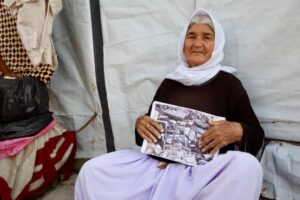
The Iraqi government has been accused of making the survivors of the Sinjar massacre fear for their future once more, almost a decade after the murderous Islamic State campaign that forced tens of thousands of people to flee from their homes.
In January, the Iraqi council of ministers set a deadline of 30 July to close 23 displacement camps in Iraqi Kurdistan. The camps are home to about 155,000 internally displaced people (IDP), mostly Yazidis, who were slaughtered, kidnapped and forced into sexual slavery in their thousands at the height of the violence in northern Iraq in 2014.
The ministry of migration and displacement (MoMD) is offering each family 4m Iraqi dinars (£2,400) towards resettlement costs and is launching a job-creation programme.
But the plans have raised concerns among those living in the camps, as well as among the UN refugee agency’s representative in Iraq, Jean-Nicolas Beuze, and rights organisations including Human Rights Watch.
The imminent closure “is leading many to feeling under pressure to return home, rather than making a voluntary and informed decision”, Beuze told reporters last week.
Baghdad has already closed all the displacement camps inside federal Iraq, with most people returning home or living in informal settlements, but in the autonomous region of Kurdistan the displaced are mostly from Sinjar, a small region that is still largely in ruins.
“If the government takes us out of this place, we have nowhere to go,” said Sare Ravo Murad Peshow, 60, who lives in Shariya camp near the city of Duhok. “I can’t go back to a place where five of my kids were killed.”
More than 2,700 Yazidi people are still missing, believed to be dead or still in captivity, according to the International Organization for Migration.
About 12,255 people live in Shariya camp, with many regarding it as a sanctuary. “We don’t have a job, a shop or a car. Only God and those who do good deeds help us,” said Peshow, whose son and four grandsons were kidnapped by IS in Sinjar. Only one grandson has returned.
She and her husband, like most people here, depend on MoMD food parcels, delivered every two or three months, and help from other residents.
Peshow said she had yet to learn if her application for government compensation, which is available to those from Sinjar whose property was damaged by IS, had been approved.
Another resident, Tahseen Hussen Osman Rasho, 39, said: “Some people have no land to build on – 4m dinars, that’s not enough to rebuild a single room.
